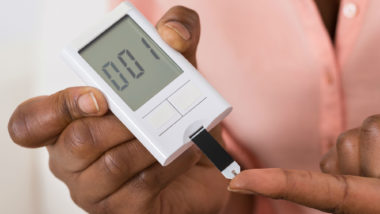 Although lower limb amputations related to complications from diabetes have been decreasing over the past 20 years, a popular diabetes medication may be increasing that risk for many diabetics. Canagliflozin, the active drug in the diabetes drug Invokana, may increase the risk of amputations for diabetics.
Although lower limb amputations related to complications from diabetes have been decreasing over the past 20 years, a popular diabetes medication may be increasing that risk for many diabetics. Canagliflozin, the active drug in the diabetes drug Invokana, may increase the risk of amputations for diabetics.
Invokana Risks
The U.S. Food and Drug Administration (FDA) has confirmed that use of canagliflozin increases the risk of leg and foot amputations. New data from two clinical trials has shown a link between the diabetes drug Invokana and loss of toes, feet, or legs. Following the reveal of this data, the FDA announced that it will require warnings to be added to the drug labels for canagliflozin.
Invokana Clinical Trials
The two clinical trials linking Invokana to amputations were CANVAS (Canagliflozin Cardiovascular Assessment Study) and CANVAS-R (A Study of the Effects of Canagliflozin on Renal Endpoints in Adult Participants With Type 2 Diabetes Mellitus). According to the CANVAS trial, over a year’s time, the amputation risk for SGLT2 inhibitors was 5.9 out of every 1,000 patients taking the drug.
This was compared to 2.8 out of every 1,000 treated with a placebo. The CANVAS-R trial showed the amputation risk was 7.5 for every 1,000 patients treated with canagliflozin, and 4.2 out of every 1,000 for those taking the placebo.
Does Invokana Cause Amputation?
Diabetics are at an increased risk for amputations of the toes, feet, or entire lower limbs. According to the U.S. Centers for Disease Control (CDC), more than 70,000 lower limb amputations were performed on adults with diabetes in 2010. Nearly 67 percent of U.S. amputations are related to complications from diabetes. The diabetic amputation rate is 28 times higher than the rate for non-diabetics.
Why there’s a link between the diabetes drug Invokana and the increased risk of amputation is not known. It may be related to constricted blood vessels or blood flow.
Patients taking Invokana should be aware of any new pain or tenderness in their legs and feet, and be on the lookout for the development of sores, ulcers, or infections. Patients are recommended to continue taking their diabetes medications until they have discussed alternative treatment options with their doctor.
Invokana Background
Invokana is a once a day pill for the treatment of type-2 diabetes in adults. The brand name for canagliflozin, it has been on the market since 2013. Invokana is estimated to be taken by more than 1.5 million people.
In addition to helping diabetics lower their blood sugar and A1C, it may also reduce the risk of major cardiovascular events including heart attack, stroke, and cardiovascular death. Invokana may also help diabetics with weight loss, and lowering their systolic blood pressure.
Invokana is part of a class of prescription medications known as SGLT2 Inhibitors, which stands for sodium glucose co-transporter 2, and work by lowering blood sugar by causing the kidneys to remove sugar from the body through the urine, according to the FDA The medication allows a patient to get rid of up to 100 grams of excess glucose per day.
It bears mentioning that concerns about Invokana were expressed by medical experts almost from the beginning. At a meeting of the FDA Endocrinologic and Metabolic Drugs Committee in January 2013, a prominent physician noted that while there was “no evidence of any improved clinical outcomes” with Invokana when compared with metformin (the old first-line treatment), studies had indicated an elevated risk of heart attack and stroke. This was due to an increased concentration of red blood cells, which makes the formation of blood clots and embolism more likely.
Two other physicians who worked for the FDA at the time also pointed out the association between the use of Invokana and cardiovascular events.
Are There Other Invokana Risks?
Glflozin drugs such as Invokana have also been liked to kidney damage, osteoporosis and a life-threatening condition known as ketoacidosis, in which blood pH levels fall dangerously low (becoming acidic). Most recently, Invokana and other drugs in its class, have been associated with a flesh-eating bacterial infection known as Fournier’s gangrene, which attacks the genital and peritoneal area. This disease, which usually affects older men with certain co-morbidities (such as obesity and a history of alcohol abuse), has been seen in both men and women taking SGLT2 inhibitors.
Patients who have been prescribed the type-2 diabetes drug Invokana and suffered complications including amputation may be eligible to join an Invokana investigation or lawsuit and pursue compensation for their pain and suffering.
Contact an experienced Invokana attorney today to discuss your legal options if you or a loved one had to undergo a lower limb amputation after taking Invokana, Invokamet or Invokamet XR, including a toe amputation, foot amputation, knee amputation or leg amputation. Fill out the form on this page to obtain a FREE case evaluation with an Invokana amputation attorney.
ATTORNEY ADVERTISING
Top Class Actions is a Proud Member of the American Bar Association
LEGAL INFORMATION IS NOT LEGAL ADVICE
Top Class Actions Legal Statement
©2008 – 2026 Top Class Actions® LLC
Various Trademarks held by their respective owners
This website is not intended for viewing or usage by European Union citizens.
Get Help – It’s Free
Join a Free Invokana Class Action Lawsuit Investigation
If you qualify, an attorney will contact you to discuss the details of your potential case at no charge to you.
Please Note: If you want to participate in this investigation, it is imperative that you reply to the law firm if they call or email you. Failing to do so may result in you not getting signed up as a client or getting you dropped as a client.
E-mail any problems with this form to:
[email protected].
Oops! We could not locate your form.












